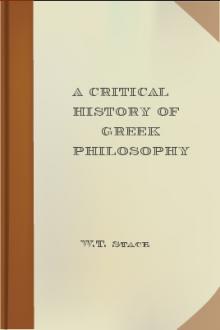Hegel's Philosophy of Mind by Georg Wilhelm Friedrich Hegel (novels to improve english .TXT) 📕

- Author: Georg Wilhelm Friedrich Hegel
- Performer: -
Book online «Hegel's Philosophy of Mind by Georg Wilhelm Friedrich Hegel (novels to improve english .TXT) 📕». Author Georg Wilhelm Friedrich Hegel
The aforesaid shallow pantheism is an equally obvious inference from this shallow identity. All that those who employ this invention of their own to accuse philosophy gather from the study of God's relation to the world is that the one, but only the one factor of this category of relation—and that the factor of indeterminateness—is identity. Thereupon they stick fast in this half-perception, and assert—falsely as a fact—that philosophy teaches the identity of God and the world. And as in their judgment either of the two,—the world as much as God—has the same solid substantiality as the other, they infer that in the philosophic Idea God is composed of God and the world. Such then is the idea they form of pantheism, and which they ascribe to philosophy. Unaccustomed in their own thinking and apprehending of thoughts to go beyond such categories, they import them into philosophy, where they are utterly unknown; they thus infect it with the disease against which they subsequently raise an outcry. If any difficulty emerge in comprehending God's relation to the world, they at once and very easily escape it by admitting that this relation contains for them an inexplicable contradiction; and that hence, they must stop at the vague conception of such relation, perhaps under the more familiar names of, e.g. omnipresence, providence, &c. Faith in their use of the term means no more than a refusal to define the conception, or to enter on a closer discussion of the problem. That men and classes of untrained intellect are satisfied with such indefiniteness, is what one expects; but when a trained intellect and an interest for reflective study is satisfied, in matters admitted to be of superior, if not even of supreme interest, with indefinite ideas, it is hard to decide whether the thinker is really in earnest [pg 195] with the subject. But if those who cling to this crude “rationalism” were in earnest, e.g. with God's omnipresence, so far as to realise their faith thereon in a definite mental idea, in what difficulties would they be involved by their belief in the true reality of the things of sense! They would hardly like, as Epicurus does, to let God dwell in the interspaces of things, i.e. in the pores of the physicists,—said pores being the negative, something supposed to exist beside the material reality. This very “Beside” would give their pantheism its spatiality,—their everything, conceived as the mutual exclusion of parts in space. But in ascribing to God, in his relation to the world, an action on and in the space thus filled on the world and in it, they would endlessly split up the divine actuality into infinite materiality. They would really thus have the misconception they call pantheism or all-one-doctrine, only as the necessary sequel of their misconceptions of God and the world. But to put that sort of thing, this stale gossip of oneness or identity, on the shoulders of philosophy, shows such recklessness about justice and truth that it can only be explained through the difficulty of getting into the head thoughts and notions, i.e. not abstract unity, but the many-shaped modes specified. If statements as to facts are put forward, and the facts in question are thoughts and notions, it is indispensable to get hold of their meaning. But even the fulfilment of this requirement has been rendered superfluous, now that it has long been a foregone conclusion that philosophy is pantheism, a system of identity, an All-one doctrine, and that the person therefore who might be unaware of this fact is treated either as merely unaware of a matter of common notoriety, or as prevaricating for a purpose. On account of this chorus of assertions, then, I have believed myself obliged to speak at more length and exoterically on the outward and [pg 196] inward untruth of this alleged fact: for exoteric discussion is the only method available in dealing with the external apprehension of notions as mere facts,—by which notions are perverted into their opposite. The esoteric study of God and identity, as of cognitions and notions, is philosophy itself.
§ 574. This notion of philosophy is the self-thinking Idea, the truth aware of itself (§ 236),—the logical system, but with the signification that it is universality approved and certified in concrete content as in its actuality. In this way the science has gone back to its beginning: its result is the logical system but as a spiritual principle: out of the presupposing judgment, in which the notion was only implicit and the beginning an immediate,—and thus out of the appearance which it had there—it has risen into its pure principle and thus also into its proper medium.
§ 575. It is this appearing which originally gives the motive of the further development. The first appearance is formed by the syllogism, which is based on the Logical system as starting-point, with Nature for the middle term which couples the Mind with it. The Logical principle turns to Nature and Nature to Mind. Nature, standing between the Mind and its essence, sunders itself, not indeed to extremes of finite abstraction, nor itself to something away from them and independent,—which, as other than they, only serves as a link between them: for the syllogism is in the Idea and Nature is essentially defined as a transition-point and negative factor, and as implicitly the Idea. Still the mediation of the notion has the external form of transition, and the science of Nature presents itself as the course of necessity, so that it is only in the one extreme that the liberty of the notion is explicit as a self-amalgamation.
§ 576. In the second syllogism this appearance is so [pg 197] far superseded, that that syllogism is the standpoint of the Mind itself, which—as the mediating agent in the process—presupposes Nature and couples it with the Logical principle. It is the syllogism where Mind reflects on itself in the Idea: philosophy appears as a subjective cognition, of which liberty is the aim, and which is itself the way to produce it.
§ 577. The third syllogism is the Idea of philosophy, which has self-knowing reason, the absolutely-universal, for its middle term: a middle, which divides itself into Mind and Nature, making the former its presupposition, as process of the Idea's subjective activity, and the latter its universal extreme, as process of the objectively and implicitly existing Idea. The self-judging of the Idea into its two appearances (§§ 575, 576) characterises both as its (the self-knowing reason's) manifestations: and in it there is a unification of the two aspects:—it is the nature of the fact, the notion, which causes the movement and development, yet this same movement is equally the action of cognition. The eternal Idea, in full fruition of its essence, eternally sets itself to work, engenders and enjoys itself as absolute Mind.





Comments (0)